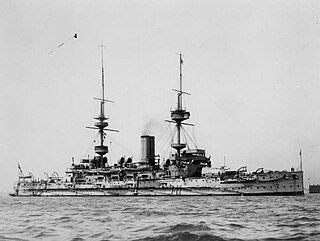
The third HMS Illustrious of the British Royal Navy was a Majestic-class pre-dreadnought battleship. The ship was built at the Chatham Dockyard; her keel was laid down in March 1895, her completed hull was launched in September 1896, and she was commissioned into the fleet in April 1898. She was armed with a main battery of four 12-inch (305 mm) guns and a secondary battery of twelve 6-inch (152 mm) guns. The ship had a top speed of 16 knots.
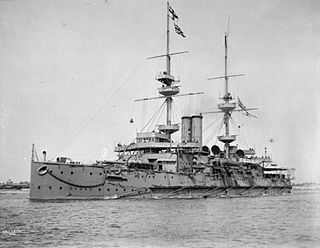
HMS Caesar was a Majestic-class pre-dreadnought battleship of the Royal Navy, named after the Roman military and political leader Julius Caesar. The ship was built at the Portsmouth Dockyard, starting with her keel laying in March 1895. She was launched in September 1896 and was commissioned into the fleet in January 1898. She was armed with a main battery of four 12-inch (305 mm) guns and a secondary battery of twelve 6-inch (152 mm) guns. The ship had a top speed of 16 knots.

The Royal Sovereign class was a group of eight pre-dreadnought battleships built for the Royal Navy in the 1890s. The ships spent their careers in the Mediterranean, Home and Channel Fleets, sometimes as flagships, although several were mobilised for service with the Flying Squadron in 1896 when tensions with the German Empire were high following the Jameson Raid in South Africa. Three ships were assigned to the International Squadron formed when Greek Christians rebelled against the Ottoman Empire's rule in Crete in 1897–1898.
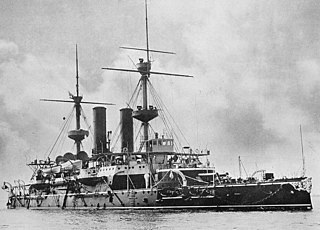
HMS Hood was a modified Royal Sovereign-class pre-dreadnought battleship built for the Royal Navy in the early 1890s. She differed from the other ships of the class in that she had cylindrical gun turrets instead of barbettes and a lower freeboard. She served most of her active career in the Mediterranean Sea, where her low freeboard was less of a disadvantage. The ship was placed in reserve in 1907 and later became the receiving ship at Queenstown, Ireland. Hood was used in the development of anti-torpedo bulges in 1913 and was scuttled in late 1914 to act as a blockship across the southern entrance of Portland Harbour after the start of World War I.

HMS Prince of Wales was a London-class pre-dreadnought battleship built for the Royal Navy in the first decade of the 20th century. She was one of two ships of the London- or Queen sub-class. Shortly after completion the ship was assigned to the Mediterranean Fleet and then to the Atlantic in 1909 and Home Fleets three year later. Prince of Wales often served as a flagship during her career.

HMS Albemarle was a pre-dreadnought Duncan-class battleship of the Royal Navy, named after George Monck, 1st Duke of Albemarle. Built to counter a group of fast Russian battleships, Albemarle and her sister ships were capable of steaming at 19 knots, making them the fastest battleships in the world. The Duncan-class battleships were armed with a main battery of four 12-inch (305 mm) guns and they were broadly similar to the London-class battleships, though of a slightly reduced displacement and thinner armour layout. As such, they reflected a development of the lighter second-class ships of the Canopus-class battleship. Albemarle was built between her keel laying in January 1900 and her completion in November 1903.

HMS Camperdown was an Admiral-class battleship of the Royal Navy, named after Adam Duncan, 1st Viscount Duncan of Camperdown.

HMS Rodney was a battleship of the Victorian Royal Navy, a member of the Admiral class of warships designed by Nathaniel Barnaby. The ship was the last British battleship to carry a figurehead although smaller ships continued to carry them.

HMS Royal Sovereign was the lead ship of the seven ships in her class of pre-dreadnought battleships built for the Royal Navy in the 1890s. The ship was commissioned in 1892 and served as the flagship of the Channel Fleet for the next five years. She was transferred to the Mediterranean Fleet in 1897 and returned home in 1902, and was briefly assigned as a coast guard ship before she began a lengthy refit in 1903–1904. Royal Sovereign was reduced to reserve in 1905 and was taken out of service in 1909. The ship was sold for scrap four years later and subsequently broken up in Italy.
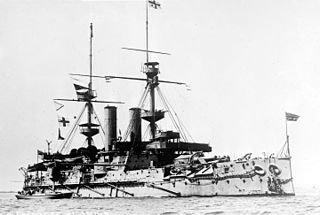
HMS Empress of India was one of seven Royal Sovereign-class pre-dreadnought battleships built for the Royal Navy during the 1890s. The ship was commissioned in 1893 and served as the flagship of the second-in-command of the Channel Fleet for two years. She was transferred to the Mediterranean Fleet in 1897, during which time Empress of India was assigned to the International Squadron blockading Crete during the uprising there. She returned home in 1901 and was briefly assigned as a coast guard ship in Ireland before she became the second flagship of the Home Fleet. The ship was reduced to reserve in 1905 and accidentally collided with the submarine HMS A10 the following year. Empress of India was taken out of service in early 1912 and accidentally struck a German sailing ship while under tow. She was sunk as a target ship in 1913.

HMS Royal Oak was one of seven Royal Sovereign-class pre-dreadnought battleships built for the Royal Navy during the 1890s. Upon her completion in 1894, she was initially placed in reserve until mobilised in 1896 for service with the Flying Squadron. After returning briefly to reserve, the ship was assigned the following year to the Mediterranean Fleet. Royal Oak remained there until 1902 when she returned home; after a refit, the ship was assigned to the Home Fleet, where she served as the flagship of the fleet's second-in-command in 1904–05. Royal Oak was then reduced to reserve until she was taken out of service in 1911. The ship was sold for scrap in early 1914.

The Centurion-class battleships were a pair of pre-dreadnought battleships built for the Royal Navy in the 1890s. They were rated as second-class battleships because they were less heavily armed and armoured than the first-class battleships. They were designed for service abroad and were given higher speed and longer range to counter the armoured cruisers then being built as commerce raiders.

HMS Barfleur was the second and last of the Centurion-class pre-dreadnought battleships built for the Royal Navy in the 1890s. Intended for service abroad, they exchanged heavy armour and a powerful armament for high speed and long range to counter the foreign armoured cruisers then being built as commerce raiders and were rated as second-class battleships.
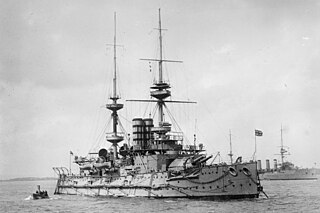
HMS Mars was a Royal Navy pre-dreadnought battleship of the Majestic class, the seventh member of a class of nine ships. The ship was laid down in the Laird Brothers shipyard in June 1894, she was launched in March 1896, and she was commissioned into the fleet in June 1897. She was armed with a main battery of four 12-inch (305 mm) guns and a secondary battery of twelve 6-inch (152 mm) guns. The ship had a top speed of 16 knots.
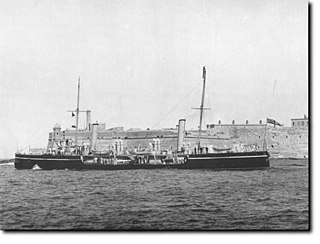
The sixth HMS Harrier was a Dryad-class torpedo gunboat. She was launched at Devonport Dockyard on 20 February 1894, and saw service in the Mediterranean and in fishery protection. She served as a minesweeper during World War I and was sold for commercial use in 1920.
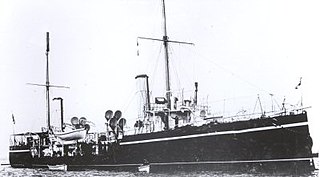
The sixth HMS Hazard was a Dryad-class torpedo gunboat of the Royal Navy. She was launched in 1894 and was converted into the world's first submarine depot ship in 1901. She collided with the submarine A3 on 2 February 1912, killing 14 men, and was herself sunk in collision with SS Western Australia on 28 January 1918.
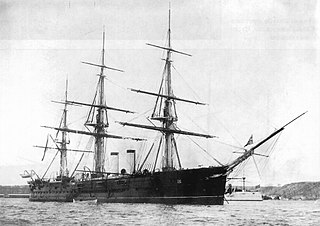
Gerzog Edinburgski was an armoured cruiser of the General-Admiral class built for the Imperial Russian Navy. She was the sister ship of General-Admiral and was named after Alfred, Duke of Saxe-Coburg and Gotha, Duke of Edinburgh who married Grand Duchess Maria Alexandrovna of Russia.

Francesco Morosini was an ironclad battleship built in the 1880s and 1890s for the Italian Regia Marina. The ship, named for Francesco Morosini, the 17th-century Doge of Venice, was the second of three ships in the Ruggiero di Lauria class, along with Ruggiero di Lauria and Andrea Doria. She was armed with a main battery of four 356 mm (14 in) guns, was protected with 451 mm (17.75 in) thick belt armor, and was capable of a top speed of 17 knots.
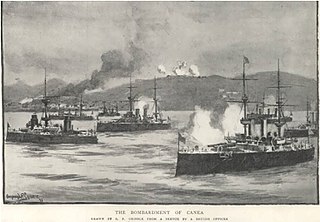
The International Squadron was a naval squadron formed by a number of Great Powers in early 1897, just before the outbreak of the Greco-Turkish War of 1897, to intervene in a native Greek rebellion on Crete against rule by the Ottoman Empire. Warships from Austria-Hungary, France, the German Empire, Italy, the Russian Empire, and the United Kingdom made up the squadron, which operated in Cretan waters from February 1897 to December 1898.






















